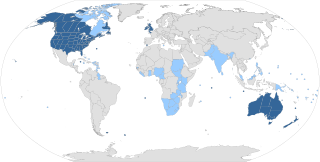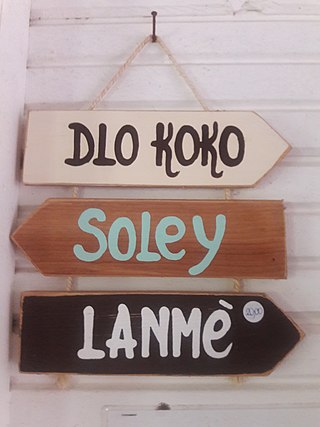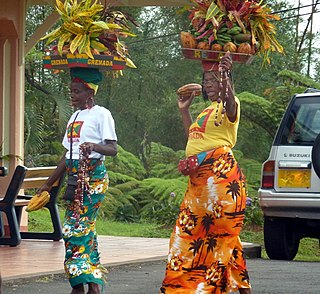Related Research Articles
The history of Grenada in the Caribbean, part of the Lesser Antilles group of islands, covers a period from the earliest human settlements to the establishment of the contemporary nationstate of Grenada. First settled by indigenous peoples, Grenada by the time of European contact was inhabited by the Caribs. French colonists killed most of the Caribs on the island and established plantations on the island, eventually importing African slaves to work on the sugar plantations.

The demography of the people of Grenada, Grenadians, includes population density, ethnicity, education level, health of the populace, economic status, religious affiliations and other aspects of the population.

Creole peoples may refer to various ethnic groups around the world. The term's meaning exhibits regional variations, often sparking debate.

The French West Indies or French Antilles are the parts of France located in the Antilles islands of the Caribbean:
Caribbean English is a set of dialects of the English language which are spoken in the Caribbean and most countries on the Caribbean coasts of Central America and South America. Caribbean English is influenced by, but is distinct to the English-based creole languages spoken in the region. Though dialects of Caribbean English vary structurally and phonetically across the region, all are primarily derived from British English and West African languages. In some countries with a plurality Indian population, such as Trinidad and Tobago and Guyana, Caribbean English has further been influenced by Hindustani and other South Asian languages.

A Spanish creole, or Spanish-based creole language, is a creole language for which Spanish serves as its substantial lexifier.

The English-speaking world comprises the 88 countries and territories in which English is an official, administrative, or cultural language. In the early 2000s, one billion to two billion people spoke English, making it the largest language by number of speakers, the third largest language by number of native speakers, and the most widespread language geographically. The countries in which English is the native language of most people are sometimes termed the Anglosphere. Speakers of English are called Anglophones.
In addition to its classical and modern literary form, Malay had various regional dialects established after the rise of the Srivijaya empire in Sumatra, Indonesia. Also, Malay spread through interethnic contact and trade across the south East Asia Archipelago as far as the Philippines. That contact resulted in a lingua franca that was called Bazaar Malay or low Malay and in Malay Melayu Pasar. It is generally believed that Bazaar Malay was a pidgin, influenced by contact among Malay, Hokkien, Portuguese, and Dutch traders.

Antillean Creole is a French-based creole that is primarily spoken in the Lesser Antilles. Its grammar and vocabulary include elements of French, Carib, English, and African languages.
Virgin Islands Creole, or Virgin Islands Creole English, is an English-based creole consisting of several varieties spoken in the Virgin Islands and the nearby SSS islands of Saba, Saint Martin and Sint Eustatius, where it is known as Saban English, Saint Martin English, and Statian English, respectively.

The official languages of the Caribbean island-state of Aruba are Papiamento and Dutch, but most Arubans speak a minimum of four languages, including English and Spanish. Schools require students to learn English, Spanish and to a lesser extent French. According to the Government of Aruba the mother tongue and primary vernacular of almost all Arubans is Papiamento, an Afro-Portuguese Creole language spoken since the 16th century. The language, however, was not widespread in Aruba till the 18th and 19th centuries when most materials on the island and even Roman Catholic schoolbooks were written in Papiamento.

Carriacou is an island of the Grenadine Islands. It is a part of Grenada, and is located in the south-eastern Caribbean Sea, northeast of the island Grenada and the north coast of South America. The name is derived from the Carib language Kayryouacou.

Réunion Creole, or Reunionese Creole, is a French-based creole language spoken on Réunion. It is derived mainly from French and includes terms from Malagasy, Hindi, Portuguese, Gujarati and Tamil. In recent years, there has been an effort to develop a spelling dictionary and grammar rules. Partly because of the lack of an official orthography but also because schools are taught in French, Réunion Creole is rarely written. Notably, two translations of the French comic Asterix have been published.
An English-based creole language is a creole language for which English was the lexifier, meaning that at the time of its formation the vocabulary of English served as the basis for the majority of the creole's lexicon. Most English creoles were formed in British colonies, following the great expansion of British naval military power and trade in the 17th, 18th and 19th centuries. The main categories of English-based creoles are Atlantic and Pacific.
The languages of North America reflect not only that continent's indigenous peoples, but the European colonization as well. The most widely spoken languages in North America are English, Spanish, and to a lesser extent French, and especially in the Caribbean, creole languages lexified by them.

Grenada is an island country of the West Indies in the eastern Caribbean Sea. The southernmost of the Windward Islands, Grenada is directly south of Saint Vincent and the Grenadines and about 100 miles (160 km) north of Trinidad and the South American mainland.

Afro-Grenadians or Black Grenadians are Grenadian people of largely African descent. This term is not generally recognised by Grenadians or indeed Caribbeans. They usually refer to themselves simply as 'Grenadians' or 'Caribbean'. The term was first coined by an African Americans history professor, John Henrik Clarke (1915–1998), in his piece entitled A Note on Racism in History. The term may also refer to a Grenadian of African ancestry. Social interpretations of race are mutable rather than deterministic and neither physical appearance nor ancestry are used straightforwardly to determine whether a person is considered a Black Grenadian. According to the 2012 Census, 82% of Grenada's population is Black, 13% is mixed European and black and 2% is of Indian origin.
Grenadian Americans are Americans whose ancestry came from the Caribbean island of Grenada, or Grenadians who have American citizenship. Since 1984, nearly 850 Grenadians arrive legally in the United States each year, and the number of Grenadian Americans was 25,924 in 2000. They began immigrating to the US primarily from 1950. Between 2007 and 2011, there were approximately 30,320 Grenadian-born residents in the United States.
Dominican Creole French is a French-based creole, which is a widely spoken language in Dominica. It can be considered a distinct dialect of Antillean Creole.
Grenadian Creole is a variety of Antillean Creole. In Grenada and among Grenadians, it is referred to as patois.
References
- ↑ Grenadian Creole English at Ethnologue (18th ed., 2015) (subscription required)
- ↑ Ethnologue report for Southern
- ↑ Ethnologue report for language code:gcl
- ↑ "Grenada – History". Archived from the original on 2015-02-16. Retrieved 2019-01-14.
- ↑ French Creole in Grenada
- 1 2 Chase, Thomas R.; Chase, Zarah A. (2018-01-30). Abridged Handbook of Grenadian Creole English and French Names: A Dictionary of Grenadian Creole English with Grammar & Syntax. AuthorHouse. ISBN 978-1-5462-1688-9.